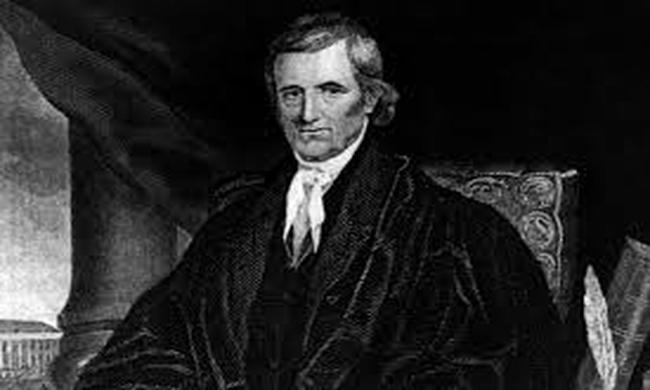A version of this essay was first published in the Nov. 13, 2019 Epoch Times
This year marks the 200th anniversary of the Supreme Court’s ruling in McCulloch v. Maryland. In that case, Chief Justice John Marshall upheld Congress’s power to charter a national bank—a distant forerunner of the modern Federal Reserve System.
Nearly all constitutional writers consider McCulloch one of the Supreme Court’s most important cases. They are correct to do so.
But many also depict McCulloch as justifying vast federal powers under a broad interpretation of the Constitution. They portray Marshall as a “big government” judge. That portrayal is wrong.
There are at least two well-grounded reasons Marshall’s opinion in McCulloch is important. The first is that it clarified some basic facts about the constitutional system.
McCulloch explained that the people, not the states, created the federal government and granted its powers. As a young lawyer, Marshall had been a leading spokesman for the Constitution, particularly in Virginia. In McCulloch, Marshall explained—as James Madison had before him—that the Constitution’s legal force comes from approval by popularly-elected state ratifying conventions meeting from 1787 through 1790.
It follows that the first rule of constitutional interpretation is the understanding of the ratifiers. It is not, as some conservatives say, the “intent of the framers” or “the original public meaning.” Nor should we, some liberals contend, construe the Constitution through “evolving social standards” or novel interpretive theories.
Moreover, McCulloch clarified that under the Constitution state and federal governments operate fairly independently of each other. Neither level of government should try to dictate to the other nor obstruct the other’s core functions. Because Congress designed the national bank to assist Congress in carrying out its core functions, McCulloch voided a state attempt to tax the bank.
The second reason McCulloch is so important is Marshall’s use of established law and legal methods—rather than tailor-made theories—for interpreting the Constitution. This is noteworthy in his discussion of whether the national bank was valid under the Constitution’s Necessary and Proper Clause.
The Constitution lists the powers of Congress. These include such functions as national defense, borrowing money, taxing, postal system, the monetary system, and regulating foreign and interstate commerce. In addition to these explicit items, the Constitution adds that “The Congress shall have Power . . . To make all Laws, which shall be necessary and proper for carrying into Execution” its listed powers.
The Constitution list of explicit powers does not include chartering a national bank. In McCulloch, the court had to determine whether chartering the bank was “necessary and proper” to carrying out Congress’s explicit powers.
Marshall, like other lawyers of his time, was familiar with documents by which one person or group granted authority to another—documents such as powers of attorney, wills, trust instruments, and statutes. The phrase “necessary and proper” was common in such documents.
As used in the Constitution, the “necessary and proper” phrase meant that in addition to the functions explicitly listed, the person or group receiving authority could exercise incidental powers. These were lesser powers intended to accompany the listed ones. Lesser powers usually were incidental if they were customary or necessary to carrying out the listed functions.
For example, it is customary for a manager hiring employees to investigate candidates before hiring them. So a manager with power to hire employees usually has incidental authority to investigate candidates. Similarly, a real estate broker with authority to sell a vacant building usually has incidental authority to clean it for showing.
In like manner, the Constitution’s grant of power to Congress to impose taxes carries with it incidental authority to obtain office space for revenue officers.
Marshall’s McCulloch opinion shows that he understood the Necessary and Proper Clause as embodying the law of incidental powers. He explained that the Constitution didn’t mention incorporation because incorporation was merely a subsidiary power rather than a “great power” like national defense and finance. Constitutions, unlike ordinary laws, generally left subsidiary powers to implication. This was the context for Marshall’s famous phrase, “we must never forget that it is a constitution we are expounding.”
Marshall further explained that national banks were customary and necessary for government financial and defense functions.
Marshall used other ordinary legal methods to support his conclusion. For example, he emphasized that in 1791 leading Founders had debated the constitutionality of a national bank both in and out of Congress—and most of them concluded the bank was constitutional. This process of consulting “contemporaneous exposition” was (and is) a traditional way of interpreting statutes and documents. Marshall didn’t resort to novel interpretive theories or evolving social standards.
In the 20th century, the Supreme Court cited McCulloch to uphold unprecedented federal spending and regulatory programs. Law school constitutional law courses sometimes treat McCulloch the same way.
But with all respect, this approach is the product of historical ignorance. Those who depict McCulloch as a “big government” decision generally are unaware of how the Founders understood the Necessary and Proper Clause and how the bank debates of 1791 focused on the details of incidental powers law. They usually are unaware of critical changes in the English language—such as the fact that when Marshall’s used the words “convenient”and “appropriate” they embodied narrower and tougher standards than they do today. Without that kind of historical perspective, McCulloch is a difficult case to understand.
And if you read McCulloch in isolation, you might think Marshall’s rejection of narrow interpretation meant he favored broad interpretation. But as Marshall’s other writings make clear, his standard was fair construction: He believed we should interpret the Constitution as its ratifiers understood it—neither more narrowly nor more broadly.








